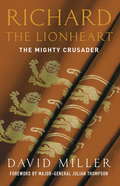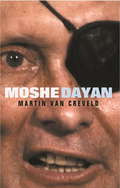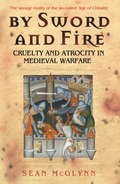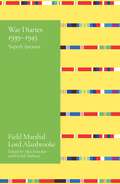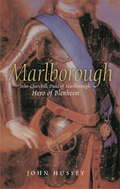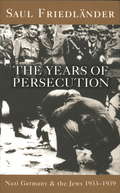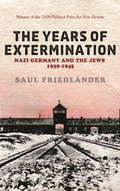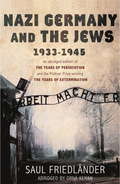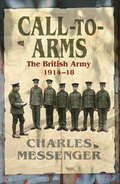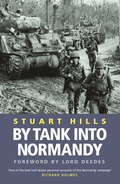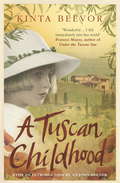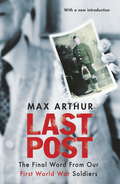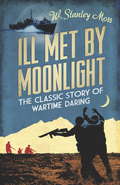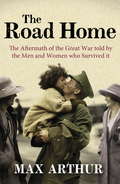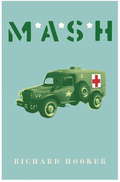- Table View
- List View
Richard the Lionheart: The Mighty Crusader
by David MillerThe greatest general of medieval timesKing Richard I's personal bravery on the battlefield won him the name 'Lionheart' but as David Miller reveals, his battles and campaigns demonstrate a brilliant grasp of strategy and tactics. The 'Lionheart' was no mere medieval 'head banger' but a thoughtful military leader, the only Crusader commander who managed to get an army to Palestine without going bankrupt in the process.
Moshe Dayan (Great Commanders Ser.)
by Martin Van CreveldMartin van Creveld's Moshe Dayan tells the story of one man and of one people, to whom he was a figurehead - a symbol of their patriotism and their determination to survive. Born in a kibbutz in 1915, Dayan joined the Hagana when he was just fourteen, thus starting early a military career that saw him serve in every war fought in the Middle East from the War of Israeli Independence in 1948 to the Yom Kippur War of 1973. Twice he led his country's forces into smashing victories. Having planned and executed the one and directed the other, with his one eye he towers over them like Nelson over the Battle of Trafalgar. Skilled in battle, skilled in diplomacy, like many powerful public figures, Moshe Dayan's private life was far from mundane. The book quotes from little-known sources, including an account written by one of his mistresses, that reveal much about his character and his life away from the battlefield. This is an honest portrayal of both the private and the public figure, which seeks to understand a man whose contribution to the state of Israel in its developing years was immeasurable.
Moshe Dayan (GREAT COMMANDERS)
by Prof Martin van CreveldMartin van Creveld's Moshe Dayan tells the story of one man and of one people, to whom he was a figurehead - a symbol of their patriotism and their determination to survive. Born in a kibbutz in 1915, Dayan joined the Hagana when he was just fourteen, thus starting early a military career that saw him serve in every war fought in the Middle East from the War of Israeli Independence in 1948 to the Yom Kippur War of 1973. Twice he led his country's forces into smashing victories. Having planned and executed the one and directed the other, with his one eye he towers over them like Nelson over the Battle of Trafalgar.Skilled in battle, skilled in diplomacy, like many powerful public figures, Moshe Dayan's private life was far from mundane. The book quotes from little-known sources, including an account written by one of his mistresses, that reveal much about his character and his life away from the battlefield. This is an honest portrayal of both the private and the public figure, which seeks to understand a man whose contribution to the state of Israel in its developing years was immeasurable.
By Sword and Fire: Cruelty And Atrocity In Medieval Warfare
by Sean McglynnSean McGlynn investigates the reality of medieval warfare. For all the talk of chivalry, medieval warfare routinely involved acts which we would consider war crimes. Lands laid waste, civilians slaughtered, prisoners massacred: this was standard fare justified by tradition and practical military necessity. It was unbelievably barbaric, but seldom uncontrolled.Such acts of atrocity were calculated, hideous cruelties inflicted in order to achieve a specific end. Sean McGlynn examines the battles of Acre and Agincourt, sieges like Béziers, Lincoln, Jerusalem and Limoges as well as the infamous chevauchées of the Hundred Years War that devastated great swathes of France. He reveals how these grisly affairs form the origin of accepted ¿rules of war¿, codes of conduct that are today being enforced in the International Court of Justice in the Hague.
By Sword and Fire: Cruelty And Atrocity In Medieval Warfare
by Sean McGlynnA vivid and original account of warfare in the Middle Ages and the cruelty and atrocity that accompanied it.Sean McGlynn investigates the reality of medieval warfare. For all the talk of chivalry, medieval warfare routinely involved acts which we would consider war crimes. Lands laid waste, civilians slaughtered, prisoners massacred: this was standard fare justified by tradition and practical military necessity. It was unbelievably barbaric, but seldom uncontrolled. Such acts of atrocity were calculated, hideous cruelties inflicted in order to achieve a specific end. Sean McGlynn examines the battles of Acre and Agincourt, sieges like Béziers, Lincoln, Jerusalem and Limoges as well as the infamous chevauchées of the Hundred Years War that devastated great swathes of France. He reveals how these grisly affairs form the origin of accepted 'rules of war', codes of conduct that are today being enforced in the International Court of Justice in the Hague.
Alanbrooke War Diaries 1939-1945: Field Marshall Lord Alanbrooke
by Lord AlanbrookeThe first complete and unexpurgated edition of the war diaries of Field Marshall Lord Alanbrooke - the most important and the most controversial military diaries of the modern era.Alanbrooke was CIGS - Chief of the Imperial General Staff - for the greater part of the Second World War. He acted as mentor to Montgomery and military adviser to Churchill, with whom he clashed. As chairman of the Chiefs of Staff committee he also led for the British side in the bargaining and the brokering of the Grand Alliance, notably during the great conferences with Roosevelt and Stalin and their retinue at Casablanca,Teheran, Malta and elsewhere. As CIGS Alanbrooke was indispensable to the British and the Allied war effort. The diaries were sanitised by Arthur Bryant for his two books he wrote with Alanbrooke. Unexpurgated, says Danchev, they are explosive. The American generals, in particular, come in for attack. Danchev proposes to centre his edition on the Second World War. Pre and post-war entries are to be reduced to a Prologue and Epilogue). John Keegan says they are the military equivalent of the Colville Diaries (Churchill's private secretary), THE FRINGES OF POWER. These sold 24,000 in hardback at Hodder in 1985.
Alanbrooke War Diaries 1939-1945: Field Marshal Lord Alanbrooke
by Lord AlanbrookeThe first complete and unexpurgated edition of the war diaries of Field Marshall Lord Alanbrooke - the most important and the most controversial military diaries of the modern era.Alanbrooke was CIGS - Chief of the Imperial General Staff - for the greater part of the Second World War. He acted as mentor to Montgomery and military adviser to Churchill, with whom he clashed. As chairman of the Chiefs of Staff committee he also led for the British side in the bargaining and the brokering of the Grand Alliance, notably during the great conferences with Roosevelt and Stalin and their retinue at Casablanca,Teheran, Malta and elsewhere. As CIGS Alanbrooke was indispensable to the British and the Allied war effort. The diaries were sanitised by Arthur Bryant for his two books he wrote with Alanbrooke. Unexpurgated, says Danchev, they are explosive. The American generals, in particular, come in for attack. Danchev proposes to centre his edition on the Second World War. Pre and post-war entries are to be reduced to a Prologue and Epilogue). John Keegan says they are the military equivalent of the Colville Diaries (Churchill's private secretary), THE FRINGES OF POWER. These sold 24,000 in hardback at Hodder in 1985.
Marlborough: The Hero of Blenheim (Great Commanders Ser.)
by John HusseyJohn Churchill was born in 1650, the son of a defeated Cavalier captain, in a household which had been ravaged and rendered almost destitute by the English Civil War. Yet by the time of his death in 1722 he was among the richest men in the country, with a dukedom, a palace and a principality to call his own. His rise to power came through a combination of good luck, astute political manoeuvring, and a brilliance on the battlefield that made him easily the most successful general of his time. In this concise biography of the man and his military genius, John Hussey describes in detail the campaigns that made Marlborough famous: the 1704 campaign to save the Austrian empire, which culminated in the great victory of Blenheim, and the audacious invasion across Louis XIV's Ne Plus Ultra lines in 1711. These campaigns are put in the context of the times, to create a portrait of a man who is still celebrated as one of the world's greatest ever military commanders.
Marlborough: The Hero of Blenheim (GREAT COMMANDERS)
by John HusseyJohn Churchill was born in 1650, the son of a defeated Cavalier captain, in a household which had been ravaged and rendered almost destitute by the English Civil War. Yet by the time of his death in 1722 he was among the richest men in the country, with a dukedom, a palace and a principality to call his own.His rise to power came through a combination of good luck, astute political manoeuvring, and a brilliance on the battlefield that made him easily the most successful general of his time. In this concise biography of the man and his military genius, John Hussey describes in detail the campaigns that made Marlborough famous: the 1704 campaign to save the Austrian empire, which culminated in the great victory of Blenheim, and the audacious invasion across Louis XIV's Ne Plus Ultra lines in 1711. These campaigns are put in the context of the times, to create a portrait of a man who is still celebrated as one of the world's greatest ever military commanders.
Nazi Germany And The Jews: 1933-1939
by Prof Saul FriedlanderA magisterial history of the Jews in Nazi Germany and the regime's policies towards them in the years prior to World War II and the Holocaust. Written by arguably the world's leading scholar on the subject.Himself a survivor, Friedlander has been a leading figure in Holocaust studies for decades and this book represents a definitive summing up of his research and that of hundreds of other historians. NAZI GERMANY AND THE JEWS: THE YEARS OF PERSECUTION is perhaps the richest examination of the subject yet written, and, crucially, one that never loses sight of the experiences of individuals in its discussion of Nazi politics and the terrible statistics and technological and administrative sophistication of the Final Solution.
Nazi Germany And the Jews: 1939-1945
by Prof Saul FriedlanderThe second and concluding volume of the definitive two-volume account of the HolocaustWith THE YEARS OF EXTERMINATION, Friedlander completes his work on Nazi Germany and the Jews. The book describes and interprets the history of the persecution and murder of the Jews throughout occupied Europe. The implementation of German extermination policies and measures depended on the submissiveness of political authorities, the assistance of local police forces and the passivity or co-operation of the populations, primarily of their political and spiritual elites. The implementation also depended on the readiness of the victimes to submit to orders, often with the hope of modifying them or surviving long enough to escape the German vice.This multifaceted representation - at all levels and in all different places - enhances the perception of the magnitude, complexity and interrelatedness of the multiple components of this history. Based on a vast variety of documents and an overwhelming choir of voices, Friedlander manages to avoid domesticating the memory of unparalleled and horrific events. The convergence of these various aspects gives THE YEARS OF EXTERMINATION its unique aulity. In this work the history of the Holocaust has found its definitive representation.
Nazi Germany and the Jews: 1933-1945
by Prof Saul FriedlanderAn abridged edition of Saul Friedlander's definitive two-volume history of the Holocaust: THE YEARS OF PERSECUTION and THE YEARS OF EXTERMINATION.Saul Friedlander's historical masterpiece is perhaps the richest examination of the Holocaust yet written, and, crucially, one that never loses sight of the experiences of individuals in its discussion of Nazi politics and the terrible statistics and technological and administrative sophistication of the Final Solution.The book's first part, dealing with the National Socialist campaign of oppression, restores the voices of Jews who were engulfed in an increasingly horrifying reality following the Nazi accession to power. Friedländer also provides the accounts of the persecutors themselves - and, perhaps most telling of all, the testimonies of ordinary German citizens. The second part covers the German extermination policies that resulted in the murder of six million European Jews.
Call to Arms: The British Army, 1914-18
by Charles MessengerThis is a comprehensive account of how the British Army coped with and adapted to the enormous challenges and pressures of the First World War -- the first major continental war that the army had had to fight for almost a hundred years. Following the course of the War, both on the Western Front and in other theatres, Charles Messenger tells how the British Army managed the challenges of command, training, technology and new weapons of war. He examines officer selection, medicine, discipline, the manpower crisis of 1918, the integration of women into the forces and many other topics. Based on years of original research, this will become the standard work of reference on the organization and administration of the biggest army Britain has ever put into the field.
Call to Arms: The British Army 1914-18
by Charles MessengerThis is a comprehensive account of how the British Army coped with and adapted to the enormous challenges and pressures of the First World War -- the first major continental war that the army had had to fight for almost a hundred years. Following the course of the War, both on the Western Front and in other theatres, Charles Messenger tells how the British Army managed the challenges of command, training, technology and new weapons of war. He examines officer selection, medicine, discipline, the manpower crisis of 1918, the integration of women into the forces and many other topics.Based on years of original research, this will become the standard work of reference on the organization and administration of the biggest army Britain has ever put into the field.
By Tank into Normandy
by Stuart HillsStuart Hills embarked his Sherman DD tank on to an LCT at 6.45 a.m., Sunday 4 June 1944. He was 20 years old, unblooded, fresh from a public-school background and Officer Cadet training. He was going to war. Two days later, his tank sunk, he and his crew landed from a rubber dinghy with just the clothes they stood in. After that, the struggles through the Normandy bocage in a replacement tank (of the non-swimming variety), engaging the enemy in a constant round of close encounters, led to a swift mastering of the art of tank warfare and remarkable survival in the midst of carnage and destruction. His story of that journey through hell to victory makes for compulsive reading.
By Tank into Normandy
by Stuart Hills'One of the best half-dozen personal accounts of the Normandy campaign' - Richard HolmesStuart Hills embarked his Sherman DD tank on to an LCT at 6.45 a.m., Sunday 4 June 1944. He was 20 years old, unblooded, fresh from a public-school background and Officer Cadet training. He was going to war. Two days later, his tank sunk, he and his crew landed from a rubber dinghy with just the clothes they stood in. After that, the struggles through the Normandy bocage in a replacement tank (of the non-swimming variety), engaging the enemy in a constant round of close encounters, led to a swift mastering of the art of tank warfare and remarkable survival in the midst of carnage and destruction. His story of that journey through hell to victory makes for compulsive reading.
A Tuscan Childhood (Vintage Departures Ser.)
by Kinta Beevor'Wonderful ... I fell immediately into her world' Frances Mayes, author of Under the Tuscan SunKinta Beevor was five years old when she fell in love with her parents' castle facing the Carrara mountains. She and her brother ran barefoot, exploring an enchanted world. They searched for wild mushrooms in the hills with Fiore the stonemason, and learned how to tickle trout. The freedom and beauty of life at the castle attracted poets, writers and painters, including D.H. Lawrence and Rex Whistler. The other side to Kinta's childhood was very different, for it was spent with her formidable great aunt, Janet Ross, in a grand villa outside Florence. But soon the old way of life and Kinta's idyllic world were threatened by war.Nostalgic, yet unsentimental and funny, A Tuscan Childhood is a book which transports the reader to bohemian, aristocratic Italy and the sound of bells from a distant campanile.
A Tuscan Childhood
by Kinta Beevor'Wonderful ... I fell immediately into her world' Frances Mayes, author of Under the Tuscan SunKinta Beevor was five years old when she fell in love with her parents' castle facing the Carrara mountains. She and her brother ran barefoot, exploring an enchanted world. They searched for wild mushrooms in the hills with Fiore the stonemason, and learned how to tickle trout. The freedom and beauty of life at the castle attracted poets, writers and painters, including D.H. Lawrence and Rex Whistler. The other side to Kinta's childhood was very different, for it was spent with her formidable great aunt, Janet Ross, in a grand villa outside Florence. But soon the old way of life and Kinta's idyllic world were threatened by war.Nostalgic, yet unsentimental and funny, A Tuscan Childhood is a book which transports the reader to bohemian, aristocratic Italy and the sound of bells from a distant campanile.
Last Post: The Final World From Our First World War Soldiers
by Max ArthurLAST POST is very consciously the last word from the handful of First World War survivors who were left alive in 2004. Now they have passed away, our final human connection with the First World War has been broken.Max Arthur, a skilled interviewer, took the very last chance we had to ask questions of those who were there.Now updated to include a new introduction by the author for the centenary of the First World War.
Last Post: The Final Word From Our First World War Soldiers
by Max ArthurThe 'Forgotten Voices' of the First World War speak for the final time.LAST POST is very consciously the last word from the handful of First World War survivors who were left alive in 2004. Now they have passed away, our final human connection with the First World War has been broken.Max Arthur, a skilled interviewer, took the very last chance we had to ask questions of those who were there. Now updated to include a new introduction by the author for the centenary of the First World War.
Ill Met By Moonlight
by W. Stanley MossNOW WITH AN INTRODUCTION BY W. STANLEY MOSS'S DAUGHTER GABRIELLA BULLOCK AND AN AFTERWORD BY PATRICK LEIGH FERMORIll Met By Moonlight is the true story of one of the most hazardous missions of the Second World War. W. Stanley Moss is a young British officer who, along with Major Patrick Leigh Fermor, sets out in Nazi-occupied Crete to kidnap General Kreipe, Commander of the Sevastopool Division, and narrowly escaping the German manhunt, bring him off the island - a vital prisoner for British intelligence.As an account of derring-do and wartime adventure, made into a classic film starring Dirk Bogarde, Ill Met By Moonlight is one of the most brilliantly written, exciting and compelling stories to come out of the Second World War.
Ill Met By Moonlight (Cassell Military Paperbacks Ser.)
by W. Stanley MossNOW WITH AN INTRODUCTION BY W. STANLEY MOSS'S DAUGHTER GABRIELLA BULLOCK AND AN AFTERWORD BY PATRICK LEIGH FERMORIll Met By Moonlight is the true story of one of the most hazardous missions of the Second World War. W. Stanley Moss is a young British officer who, along with Major Patrick Leigh Fermor, sets out in Nazi-occupied Crete to kidnap General Kreipe, Commander of the Sevastopool Division, and narrowly escaping the German manhunt, bring him off the island - a vital prisoner for British intelligence.As an account of derring-do and wartime adventure, made into a classic film starring Dirk Bogarde, Ill Met By Moonlight is one of the most brilliantly written, exciting and compelling stories to come out of the Second World War.
The Road Home: The Aftermath Of The Great War Told By The Men And Women Who Survived It
by Max Arthur11am, 11.11.1918: the war is finally over. After four long years Britain welcomed her heroes home. Wives and mothers were reunited with loved ones they'd feared they'd never see again. Fathers met sons and daughters born during the war years for the very first time. It was a time of great joy - but it was also a time of enormous change. The soldiers and nurses who survived life at the Front faced the reality of rebuilding their lives in a society that had changed beyond recognition. How did the veterans readjust to civilian life? How did they cope with their war wounds, work and memories of lost comrades? And what of the people they returned to - the independent young women who were asked to give up the work they had been enjoying, the wives who had to readjust to life with men who seemed like strangers?
The Road Home: The Aftermath of the Great War Told by the Men and Women Who Survived It
by Max ArthurHow the men and women of Britain found 'the road home' after the Great War. From the SUNDAY TIMES bestselling author of THE LOST POST.11am, 11.11.1918: the war is finally over. After four long years Britain welcomed her heroes home. Wives and mothers were reunited with loved ones they'd feared they'd never see again. Fathers met sons and daughters born during the war years for the very first time. It was a time of great joy - but it was also a time of enormous change. The soldiers and nurses who survived life at the Front faced the reality of rebuilding their lives in a society that had changed beyond recognition. How did the veterans readjust to civilian life? How did they cope with their war wounds, work and memories of lost comrades? And what of the people they returned to - the independent young women who were asked to give up the work they had been enjoying, the wives who had to readjust to life with men who seemed like strangers?
MASH
by Richard HookerThe book behind the hit TV series and movie.The doctors and nurses who worked in the Mobile Army Surgical Hospitals (MASH) during the Korean War were well trained, dedicated, and pushed to the brink. And they were young - too young to be doing what they had to do. As Richard Hooker writes in the Foreword, 'A few flipped their lids, but most of them just raised hell, in a variety of ways and degrees.'Meet the true-life heroes and lunatics who fought in the Korean War, and experience the martini-laced mornings, marathon high jinks, sexual escapades, and that perfectly corrupt football game that every fan of the movie will remember. It's also a story of hard work and skill in the face of enormous pressure and odds. Here is where it all began - the novel that made M*A*S*H a legend.
